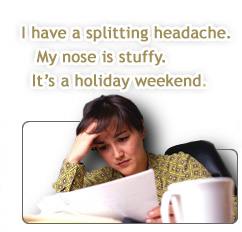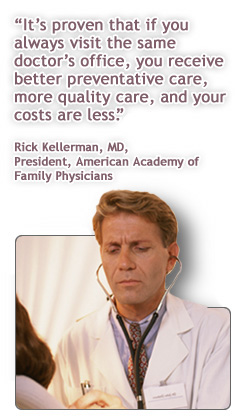
 I have a splitting headache. My nose is stuffy. It's a holiday weekend. I really don't want to visit the nearby medical clinic and pay three times my co-pay fee, and I don't have enough patience to wait and call my doctor on Monday. So I skip the expensive doc-in-the-box and drive to a local pharmacy, on a mission to find something to quiet my symptoms. I have a splitting headache. My nose is stuffy. It's a holiday weekend. I really don't want to visit the nearby medical clinic and pay three times my co-pay fee, and I don't have enough patience to wait and call my doctor on Monday. So I skip the expensive doc-in-the-box and drive to a local pharmacy, on a mission to find something to quiet my symptoms.
Once I arrive, I shuffle to the back of the store and stare at the cold remedy shelves. I try to concentrate on the packaging of several medicines, but I feel like I'm looking through fog. I take my time. After awhile, I notice someone standing at the back of the store. "You look pretty sick," she says, pointing out the obvious. I nod slowly, my head pounding. "I can help," she says and waves me her way. She says she's a nurse practitioner, so I follow. There's no line. I go right inside and sit down. How lucky is this? I'm on the fast track to medical care at a CVS-owned MinuteClinic, one of the trendy retail care clinics popping up everywhere. And I was just going to settle for cold medicine. The new convenience store
Hundreds of retail health clinics have opened across America in recent years, in discount chain stores, pharmacies, and supermarkets. (The largest company, MinuteClinic, boasts about 400 stores.) They accept most insurance; some health plans, like Blue Cross and Blue Shield of Minnesota, even link to the websites of leading retail health clinic companies. The cost is similar to the co-pay for seeing your primary care provider, with most clinics offering services that range from $15 - $110. And many stay open late at night and on weekends, providing healthcare when your doctor is typically unavailable.
You never need an appointment. You can walk in and minutes later see a board-certified nurse practitioner or a physician assistant (and sometimes a doctor) for routine health problems, like a sore throat, earache, pink eye, or poison ivy. You can also receive preventive care, such as a vaccine or cholesterol screening. They're appealing to patients who have little time or patience, like me.
I remember a colleague telling me that anemia runs in his family. He wanted a quick blood test and answer about his health, but he hates to take time off work. So instead of interrupting his workday, he went to a nearby RediClinic (available at select Walgreens and Wal-Mart stores) on a Saturday morning. It took him 5 minutes to get the test, which cost only $15. Fewer than 48 hours later, he received an e-mail with a link to a website with his test results and information about what to do next. Now, that's service.
Call it convenience-store medicine. Stop in, and get a quick exam, diagnosis, and medicine. On the way out, pick up a few odds and ends and pay at the register. It's certainly fitting for today's societal expectation of instant gratification. Buyer beware?
Beyond the growing popularity of retail health clinics, however, and their promise of convenience, you have to wonder: Just how useful are they? And what about the quality?
"It's a buyer beware situation," says Rick Kellerman, MD, president of the American Academy of Family Physicians. He argues that patients need to see one doctor, who they know and trust, for their routine healthcare. When you visit a convenience clinic, while you are getting basic medical care, it's not from a doctor, and not your doctor.
 "It's proven that if you [always visit the same doctor's office], you receive better preventative care, more quality care, and your costs are less," he says. Officially, Kellerman's organization is taking a wait-and-see approach on store-based clinics before passing judgment. On the other hand, the retail health model does receive support from the American Medical Association for routine health care -- but not for replacing your doctor. "It's proven that if you [always visit the same doctor's office], you receive better preventative care, more quality care, and your costs are less," he says. Officially, Kellerman's organization is taking a wait-and-see approach on store-based clinics before passing judgment. On the other hand, the retail health model does receive support from the American Medical Association for routine health care -- but not for replacing your doctor.
In general, these groups say that if you choose to visit a retail health clinic, you should look for: - A well-defined and limited scope of services following evidence-based medicine
- Physician supervision of the nurse practitioner or physician's assistant
- A formal connection between area healthcare facilities to provide continuity of care
- A method to refer you to another doctor if your symptoms are beyond the clinic's scope of practice
- An electronic health record system that allows your information to be shared with your family doctor's office
Last year, retail health clinic industry leaders formed the Convenient Care Association. One of their first actions was establishing their own quality and safety standards. For their part, MinuteClinic says their nurse practitioners are supervised by a doctor, while patient assessment and treatment follows nationally established clinical practice guidelines. The inconvenient truth
For all its convenience, my visit to the MinuteClinic ends just as quickly as it began. As the nurse practitioner takes my medical history, I tell her I'm pregnant. She pauses. Uh, oh, I think, as she consults a reference manual to see if pregnancy is a reason to refer me right away to my doctor. It's not, but it's also not helpful. She takes down the rest of my information and does a quick exam, peeking into my nose and ears. I have a sinus infection, she says. (This is pretty much what I already expect.) But she can't do anything about it. Decongestants are off limits for pregnant women, and she won't recommend anything else.
"I'm sorry," she says. "You should see your perinatologist." It looks like I'm beyond their well-defined scope, I think. (In fact, a 2007 survey points out that 16% of all retail clinic cases are referred to another doctor.) I leave, a little impatient, but not really disappointed. After all, my choices were visiting an expensive health clinic or calling my doctor on Monday... and they still are. For me, there's no way around that inconvenient truth.
The bottom line
Retail health clinics tend to wave the banner of bringing innovation and change to the marketplace. It's consumer-driven care to meet the need for accessibility and convenient options, at a low price. The current healthcare system encourages high costs, long waits, and brief interactions with your doctor. If all you need is someone who can tell you what's wrong and what to do about it, retail health clinics may be a good option.
But what works for one patient doesn't necessarily work for another. There's no one size fits all care option... in any healthcare system.
You have to know a retail health clinic's limitations, as I learned. For me, the clinic wasn't very useful, except to prove a point: I'm not the patient they're looking for. They don't treat complicated conditions. Store-based health clinics are useful for routine sickness. If you suspect strep throat or have a rash (and you're not pregnant), you can probably benefit from a quick trip to one of these clinics. If you have bigger problems, like heart disease, you're better off seeing your own doctor.
Editor's Note: Future editions of this newsletter will examine other innovations in healthcare that promise convenience, cost-savings, and better quality of life.  | Kelli A. Stacy is managing editor of A.D.A.M.'s Health Illustrated Encyclopedia and prefers the comfort of her own doctor's office, even if she has to wait a day or so for an appointment. Kelli can be reached at featuredstories@adamcorp.com. |
|